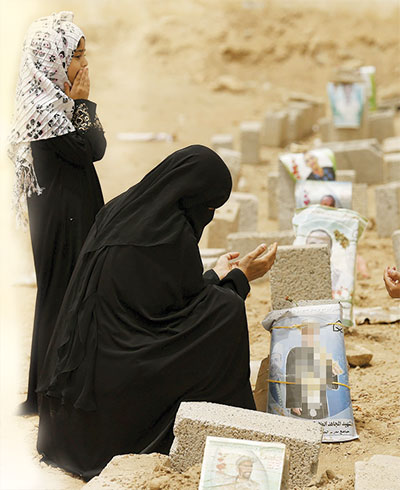The Only Solution to the Tragedy in Yemen: The Reconstruction of Peace and Love
The turmoil and conflict that began between the Shiite Houthis and Sunni Arabs in Yemen 2014 has today turned into a civil war involving almost the entire country. What we are looking at today, with the Arab coalition's intervention in the civil war in March this year with air operations aimed at supporting the internationally recognized government, is destruction and disaster.
The worst victims of this, as in all Islamic countries under fire, are innocent civilians. Hundreds of civilian targets have been hit in aerial bombardments. Thousands of civilians have been martyred.
Last Wednesday, the U.N. announced that 5,700 people, including 830 women and children, had lost their lives since March 26. Johannes Van Der Klaauw, the U.N.'s humanitarian coordinator for Yemen, said that 21.2 million people, 82% of the population, are in need of humanitarian aid. Fourteen million people are deprived of adequate health care, 1.8 million children have been unable to go to school since the fighting began and some 320,000 children are malnourished.
 |
Van Der Klaauw also reported that 120,000 people have had to flee the country as refugees, while 2.3 million people have had to leave their homes and lands. The number of human rights violations since the start of the war exceeds 8,800. (1)
According to U.N. High Commission for Human Rights spokesman Rupert Colville, more than 2,300 civilians lost their lives between March and October 2015: Again, according to Colville, two-thirds of civilians in that time frame were killed as a result of air strikes. Colville says that this level shows that something is badly amiss and that the requisite caution is not being taken. (2)Another recent example of the wide-ranging civilian losses is as follows:
 |
| The drama playing out in Yemen is not limited to murder and slaughter alone. The UN says that 80% of the 20 million civilians in Yemen stand in need of aid, and describes this as a "catastrophe." |
Last September, at least 130 Yemeni citizens were reported to have lost their lives in an aerial attack on the town of Mokha. Hassan Boucenine, the Yemeni head of mission at Doctors without Frontiers, stated that he was absolutely unable to attach any meaning to the attack, and that the target was not a military one, but explicitly a house where a wedding was taking place. (3)
The policy of the U.S., which at first sight appears to be supporting the Sunni Arab coalition, is one of the striking aspects of the war in Yemen.
Although the countries in the coalition are not openly involved in the fighting, the U.S. is one of the powers that has long been staging military operations in Yemen. Wishing to prevent the strengthening of al-Qaeda in Yemen in the wake of the Arab Spring, the U.S. stepped up unmanned aerial vehicle (UAV) attacks, thus intending to reduce al-Qaeda's room to maneuver to a minimum. Intense aerial bombings were carried out in those parts of Yemen where al-Qaeda was strong. However, rather than achieving U.S. aims, these attacks made the organization look as though they had been wronged and this reinforced opposition to the U.S. among local people.
After October 2014, when the Houthis initiated their policy of expansion toward the capital, Sana'a, the U.S. made al-Qaeda a constant target of UAV attacks and even backed the Houthi advance.
The U.S. has to date hit hundreds of al-Qaeda targets, but has never hit a Houthi one. The U.S. has also targeted tribes that oppose al-Qaeda that resist the Houthis' policies of expansion. Nabeel Khoury, a U.S. diplomat serving with NATO, says that many innocent civilians have lost their lives in every U.S. UAV attack, and that for this reason, for every person killed, 40 to 60 new 'enemies of America' emerge.
The Islamic world has a responsibility in this critical state of affairs, in which large numbers of Muslims are suffering, to strive to bring the fighting to an end as a matter of urgency and to spread a spirit of love, peace and brotherhood among all Muslims in order to bring this strife that sets brother against brother to an end. In doing so, it is also vitally important that all the needs of the Yemeni people, who are suffering terrible poverty and want and living in hunger and thirst, should be met without further loss of time.
However, even more than all these material requirements, what the people of Yemen need most of all, just like everyone else in the world, is love. Contrary to what people think, it is not weakness to regard love as the most important component in the establishment of social order. Indeed, societies with powerful bonds of love among individuals have always been far stronger in the face of destructive impacts from the inside or outside.
The Muslim people of Yemen, who until yesterday were living in peace and brotherhood, and who speak the same language and believe in the same God, can only be freed from these tragedies caused by division and dispute by re-establishing love among them. Only when the whole Islamic world, not just Yemen, fully established bonds of unity, love and brotherhood within itself, can it rid itself of the wickedness and exploitation of foreign powers that regard division and conflict among Muslims as a great opportunity, and be freed from military operations. Only then can it achieve peace, security, happiness and well-being.
Footnotes
1- http://www.npr.org/sections/parallels/2015/10/01/444912621/u-s-backed-saudi-bombing-campaign-blamed-for-civilian-deaths-in-yemen
2- http://www.npr.org/sections/parallels/2015/10/01/444912621/u-s-backed-saudi-bombing-campaign-blamed-for-civilian-deaths-in-yemen
- Introduction
- Two Countries Geographically Far Apart But Very Close in Heart and Soul: Yemen and Turkey
- Yemen, But What Sort of Yemen?
- The Problem of Poverty in Yemen and Regeneration
- How To Ensure the National Unity of Yemen?
- How Can Yemen Best Make Use of Its Natural Wealth?
- Women's Place in Yemeni Society
- The Lowest Common Denominators the Parties in Yemen Can Agree on
- The Importance of Individual Rights and Freedoms in Yemen
- Terror Is Again at the Top of Yemen's Agenda
- The Corruption Eating Away at Yemen from the Inside
- One of the Dozens of Problems Facing Yemen Is Immigration
- Key to Democracy and Development in Yemen: Education
- Countries Swamped by Debt and Interest
- Political Life in Yemen
- Why Is Military Spending Significant?
- Houthis Are the Brothers of All Yemenis
- Yemen Must Not Fall into the Trap of Identity Politics
- The Protests in Yemen Should Not Turn into a Mass Frenzy
- Mindsets Need To Change for A Permanent Peace in Yemen
- What Can Be Done To Ensure Stability in Yemen?
- Will the New Government in Yemen Bring Stability?
- Yemen Doesn't Deserve To Be A Failed Country
- The Problems of Yemen Can Be Solved When A Strong National Security Is Built
- Military Operations Do Not Always Produce A Solution
- Political Instability in Yemen Is Having a Damaging Effect on Children
- Spirit of Unity a Must for Yemen's Political Transition
- What Yemen Needs Is a Spirit of Union and Unity
- Yemenis Must Be Friends, Not Enemies
- There Is Still Hope for Peace and Democracy
- The Struggle for Power Must Not Break Yemen Apart
- Yemen Must Not Become a Trojan Horse on the Arabian Peninsula
- Developments in Bahrain, Yemen and Other Islamic Countries Must Not Be Allowed To Turn into A Sectarian Conflict
- Is This the Will of Yemenis or the Global Powers?
- Operation Decisive Storm Brings Not Stability But Death to Yemen
- Turkey Asks for Peace in Yemen, Not War
- Deaths Cannot Stop More People Being Killed
- Yemen Needs Urgent Ceasefire
- What Is Happening in Yemen Is No Longer a Political, but a Humanitarian Crisis
- An International Model To Put an End to the Conflict in the Islamic World Is Possible
- A Lack of Quality Is Feeding the Conflicts in the Islamic World
- Yemen: A Country That Nobody Sees and Nobody Hears
- The Only Solution to the Tragedy in Yemen: The Reconstruction of Peace and Love
- Conclusion
